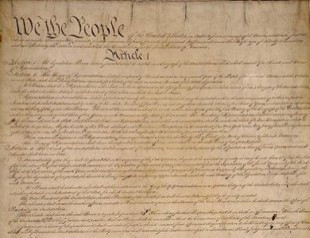27th Amendment In Constitution Violated By GOP Budget Bill? House To Vote Wednesday

As Congress recovers from its recent fiscal cliff crisis, one of the Constitution's least known Amendments may get a bit of publicity due to the ongoing budget fight between Democrats and Republicans.
Although it was submitted to the states for ratification in 1789, the 27th Amendment was not adopted until 1992. The Amendment states that “no law, varying the compensation for the services of the senators and representatives, shall take effect, until an election of representatives shall have intervened.”
Essentially, the Amendment states that a sitting congress can’t change its own salary while it is in session.
Proposed in 1789 by founding father James Madison along with the other Amendments that became the Bill of Rights, it wasn’t until 1992, when Alabama became the 38th state to sign off it, that it became law.
The 27th amendment, while keeping a relatively low profile, resurfaced in congress last week when the GOP's House leaders proposed linking congressional pay to the budget debate. The proposal brought up questions about whether the proposal violated the 27th amendment.
On Monday, the House Rules Committee published its proposed bill, about one hour before President Barack Obama’s inauguration. House GOP leaders seemed convinced that the proposed bill didn’t violate the amendment.
According to Section 2 of the bill, as cited by the National Constitution Center, a payroll administrator would withhold Congress’ pay after April 15, 2013, if it couldn’t agree on a fiscal year 2014 budget. The money would be held in an escrow account and given back to Congress' members when a budget was passed or at the end of the current 113th Congress on Jan. 1, 2015.
In exchange, Congress would raise the debt ceiling until May 18, 2013.
According to UCLA law professor Adam Winkler, withholding pay, even temporarily, would “vary” the compensation for Congress members, and in his opinion, such legislation presented a direct violation of the 27th Amendment.
“The answer is unclear because the 27th Amendment has never been authoritatively interpreted by the Supreme Court,” Winkler said in an email to the website Talking Points Memo. “Yet it seems almost certainly unconstitutional. Withholding pay effectively ‘var[ies] the compensation’ of lawmakers.”
The House will vote on the measure on Wednesday. If approved, it will head to the Senate.
© Copyright IBTimes 2024. All rights reserved.






















